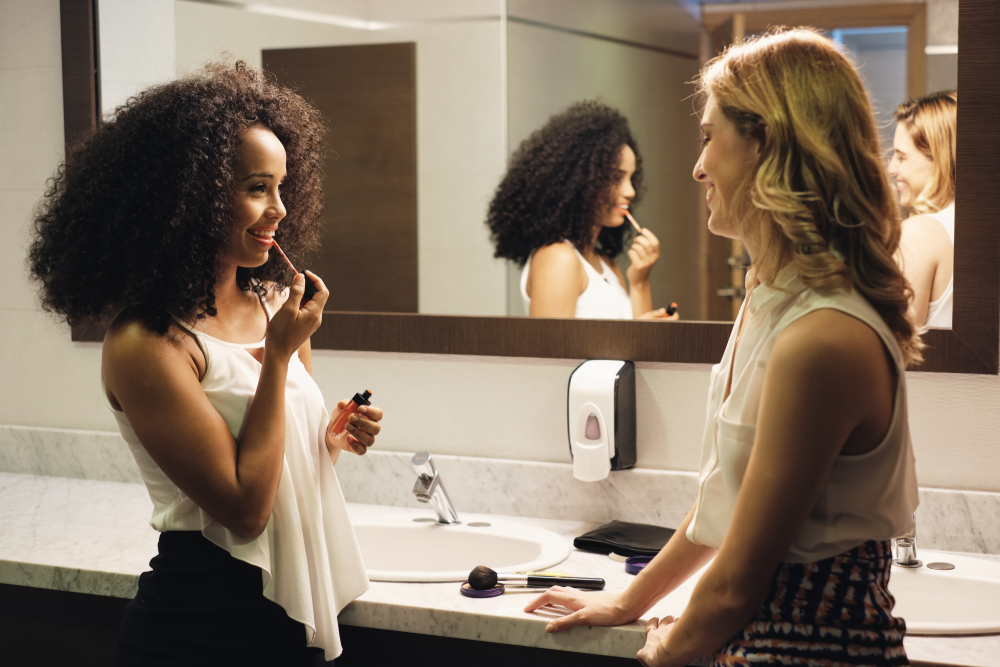Public and workplace bathrooms serve as essential private spaces where individuals expect discretion and quiet. While casual conversations might seem harmless, they can create unexpected challenges and discomfort in these intimate settings. Understanding why certain behaviors can cause issues helps maintain respectful environments for everyone.
The unique nature of these shared spaces requires careful consideration of others’ comfort and privacy needs. What might seem like innocent conversation can have far-reaching consequences for workplace relationships and personal comfort.
Privacy and personal boundaries
Bathrooms represent universal zones of privacy where people expect solitude and discretion. When conversations occur in these spaces, they can significantly impact others’ comfort levels and sense of privacy. This becomes particularly important in professional settings where maintaining appropriate boundaries is crucial.
The echoing nature of bathroom spaces often amplifies voices, making private conversations more public than intended. This can create uncomfortable situations for everyone present, potentially leading to workplace tension or personal embarrassment.
Professional reputation considerations
In workplace settings, bathroom conversations can affect professional relationships and reputation. Colleagues and supervisors may view such behavior as lacking discretion or professional judgment. This perception can influence workplace dynamics and potentially impact professional growth opportunities.
The workplace bathroom should remain a neutral space where all employees can feel comfortable. Maintaining professional boundaries in these settings helps create a more respectful work environment.
Focus and concentration disruption
Many people use bathroom breaks as moments of quiet reflection or mental preparation. Conversations in these spaces can disrupt this valuable personal time, particularly in professional or formal settings where individuals need to maintain focus and composure.
This interruption of personal space can create unnecessary stress and tension, especially during busy workdays when quiet moments are precious and rare.
Health and hygiene considerations
Engaging in conversations can inadvertently distract from proper hygiene practices. When people become engrossed in discussion, they might rush through or forget essential steps in their hygiene routine. This oversight can have broader implications for public health in shared spaces.
Maintaining focus on proper handwashing and hygiene becomes more challenging when engaged in conversation, potentially compromising the cleanliness of shared facilities.
Spatial awareness in confined areas
Bathroom spaces often provide limited room for movement or personal space. When conversations occur in these confined areas, they can create physical and emotional discomfort for others trying to navigate the space. This becomes particularly problematic during busy times or in smaller facilities.
The confined nature of these spaces can also intensify any tension or discomfort that might arise from unwanted conversation or crowding.
Inclusive space considerations
Modern facilities increasingly include gender-neutral spaces, requiring additional awareness and sensitivity. Conversations in these areas might make some users feel uncomfortable or excluded, particularly if they’re already navigating unfamiliar territory.
Maintaining quiet and respect in these spaces helps ensure everyone feels welcome and comfortable using the facilities regardless of their gender identity or personal preferences.
Creating better environments
Understanding these potential issues helps create more respectful shared spaces. Consider the following approaches to maintain appropriate bathroom etiquette:
- Reserve conversations for more appropriate settings outside the bathroom
- Respect others’ need for privacy and quiet in these spaces
- Maintain focus on proper hygiene practices
- Be mindful of professional boundaries in workplace settings
Moving forward
While brief, necessary communication in bathrooms might occasionally occur, understanding potential impacts helps maintain more comfortable shared spaces. By considering others’ needs for privacy and focusing on appropriate behavior, we can create more respectful environments that serve everyone’s needs.
Professional and personal success often relies on understanding and respecting social boundaries. Treating bathroom spaces with appropriate discretion represents an important aspect of workplace etiquette and personal consideration for others.
This story was created using AI technology.















